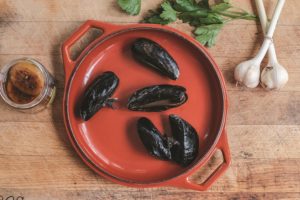Mussels will always seem glamorous to me. The first time I had them, they were presented so artfully: a small woman carrying a steaming, oversized stainless-steel pot walked into the center of the living room and set the pot down on the floor. Then she knelt next to the pot and lifted the lid with a flourish. The heady aroma of garlic, wine, and sea quieted the hum of our late-night cast party.
“Have some mussels!” she commanded, ladling generous portions of the gaping shells and broth into bowls. The blue-black mollusks with tender plump orange nuggets tucked inside were still-life worthy, briny, and bathed with butter. The woman showed us how to use a shell to pinch the meat free — no utensils required. Hungry actors, theater techs, friends, and lovers lounging on bean bags and pillows slurped and cooed.

This was in Berkeley, Calif., 1979. My boyfriend — now my husband — was stage managing the West Coast premiere of Sam Shepard’s Curse of the Starving Class. I had spent childhood summers on the Cape, but mussels weren’t part of our repertoire. To fresh-college-graduate me they were exotic.
Her name is lost to me, but I’ll never forget that cook’s authoritative ease. She knew food could be theatrical, opening up a give and take between cook and eaters. Her hospitality and pot of mussels spurred me to become a professional cook.
Decades later, welcoming a constant flow of summer visitors in Wellfleet, I return to the casual elegance of a pot of mussels. They are light on the wallet, prepped and cooked in under 20 minutes, and yield a broth that gets sopped up with bread.
A recent guest brought a jar of homemade preserved lemons. They’re simple to make with just cut lemons and salt, but they require patience — it takes about a month for the rinds to soften and the lemons to become bright with that transformed, amped-up flavor of all things fermented or preserved. (Think parmesan, bacon, or kimchi.)
As our palates become more global, this once hard-to-find ingredient that is a staple of North African cooking now shows up in lots of specialty shops (and online). Atlantic Spice in Truro has two versions, one Moroccan and the other spiced Tunisian-style with oil. A bit of preserved lemon adds dimension to salad dressings, roast chicken, grilled fish, grains, stir-fried vegetables, or a Bloody Mary. They last for a year in the fridge.

Inspired by this gift, I experimented beyond the reliably delicious swirl of butter, garlic, herbs, and wine for the steam bath I like to give mussels.
Eastham used to be mussel central but, as we’ve reported in these pages, competition with natural predators has reduced that wild harvest. The mussels I’ve bought this summer in Wellfleet and Provincetown have come from Chatham. So, this dish, with its hint of the Mediterranean, is still a fresh summery show of Cape Cod shellfish.
Mussels With Preserved Lemon and Spiced Tomatoes
Serves 4 to 6
4 pounds mussels
2 medium-large tomatoes, about 1½ pounds
5 Tbsp. unsalted butter
1 medium onion, chopped
4 to 6 garlic cloves, roughly chopped
2 to 3 Tbsp. chopped preserved lemon
1½ tsp. ground coriander, Middle Eastern spice blend, or garam masala
Generous pinch smoked Spanish paprika
Pinch red pepper flakes or cayenne
Salt
½ cup white wine
Handful chopped cilantro or flat parsley, or a mixture
Toasted or grilled bread for serving
Rinse the mussels in cold running water, tap any open shells to close. Discard any that resist closing. If there is a tuft of dark “beard” poking from the shell, tug it against the hinge to cut it off. Set mussels aside in a colander.
Halve the tomatoes crosswise to expose their seeds. Grate the cut side over the large holes of your grater, set over a shallow bowl to catch the tomato pulp. Grate down to the skin and discard the skins.
Choose a large pot with lid. Melt the butter in it over medium-high heat. Add the onion and garlic and cook until soft, with those at the edge of the pot beginning to brown, about 4 minutes. Stir in the preserved lemon and spices and cook until fragrant, about a minute.
Add the tomato pulp and raise the heat to high; simmer until the tomato thickens and darkens, about 5 minutes. Season with a bit of salt but remember the mussels will bring natural salt. Add the wine and bring to a boil.
Pour the mussels into the pot, cover with the lid, and cook over high heat, stirring occasionally until the shells open and the mussels plump up, about 5 minutes.
Stir in the herbs. Serve with grilled bread for soaking up the broth.
